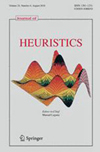The field of heuristics within the area of optimization has become extremely important as researchers and practitioners attempt to solve larger and more complex problems. With the integration of artificial intelligence principles in the area of optimization the field of heuristics has experienced a rapid growth. The Journal of Heuristics considers the importance of theoretical empirical and experimental work related to the development of heuristics providing a forum for advancing the state-of-the-art in the theory and practical application of techniques for solving problems approximately that cannot be solved exactly. The journal fosters the development understanding and practical use of heuristic solution techniques for solving business engineering and societal problems. The following areas are of interest to the journal: Practical Applications showing the benefits achieved by the particular application (i.e. reduced costs increased profits etc.). These papers can deal with new application areas for which no previous solution methods exist or with areas where previous methods have proved unsatisfactory. Theoretical Developments dealing with theoretical work on existing or new heuristics. These papers generally present mathematical work such as probabilistic analysis convergence results worst-case analysis combinatorial leverage results and theorems about special structures. Decision Analysis models that consider issues of rational decision making with limited information. Of special interest is the interface between decision analysis and the search principles used in artificial intelligence and the integration of processes in which information becomes available in stages or where data and inputs are subject to uncertainties. Artificial Intelligence -based heuristics applied to a wide variety of problems in optimization classification statistics recognition planning design and so forth. Typical approaches include genetic algorithms neural networks simulated annealing and tabu search. Learning paradigms with implications for heuristic problem solving are also encouraged. Computational Experimentation focuses on computational comparisons of heuristic methods. The Journal of Heuristics provides strict guidelines under which the experiments are to be conducted. The Journal of Heuristics also provides access to all problem instances used for computation experiments published in this area.
